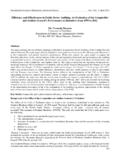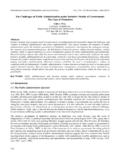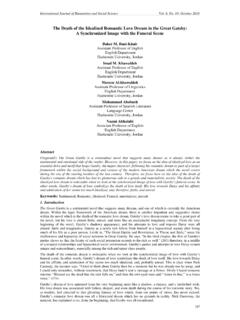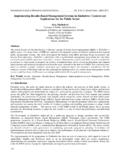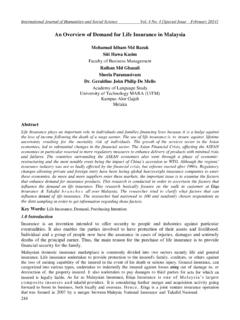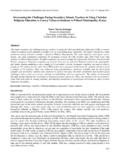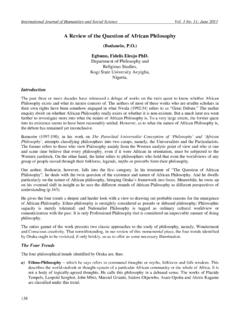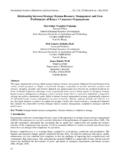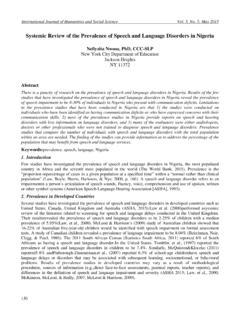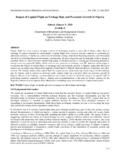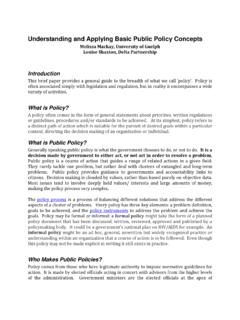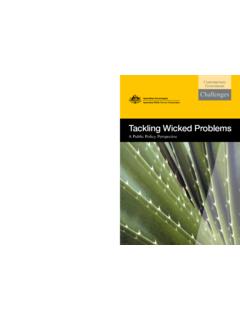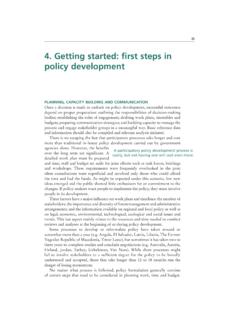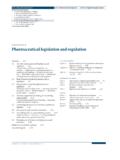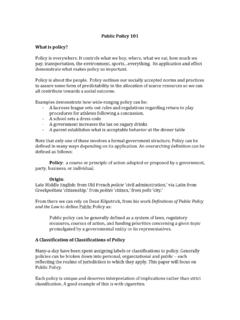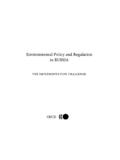Transcription of LEGISLATION, PUBLIC POLICY AND TRADITIONAL …
1 International Journal of Humanities and Social Science Vol. 1 No. 9 [Special Issue July 2011] 278 TRADITIONAL LEADERSHIP AND GOVERNANCE: LEGISLATIVE ENVIRONMENT AND POLICY DEVELOPMENT IN A DEMOCRATIC SOUTH AFRICA Dr Freddie Samuelson Khunou 1. INTRODUCTION The primary objective of this article is to discuss a plethora of legislation and government policies which impact directly or indirectly on the institution of TRADITIONAL leadership in the new South Africa. In the first ten years of democracy, the post-apartheid Parliament of South Africa enacted groundbreaking legislation . The democratic government also developed the relevant policies intended to transform and democratise the institution of TRADITIONAL leadership. The bulk of these pieces of legislation took cue from the provisions of the 1996 This article also gives an exposition of the historical background of the pre-colonial, colonial and apartheid periods, which had an impact on the institution of TRADITIONAL leadership.
2 The relevant pieces of legislation affecting the institution during the colonial and apartheid South Africa are also highlighted to demonstrate how they influenced and affected the institution of TRADITIONAL leadership. The democratic government took legislative steps to ensure that democratic processes of governance increased participation and involvement of TRADITIONAL leaders, women and their communities on matters of administration, particularly those closely related to TRADITIONAL communities, traditions and customs. 2. HISTORICAL BACKGROUND PRE-COLONIAL PERIOD In the pre-colonial era, TRADITIONAL leaders2 and TRADITIONAL authorities were important institutions, which gave effect to TRADITIONAL life and played an essential role in the day-to-day administration of their areas and lives of TRADITIONAL people. The relationship between a TRADITIONAL leader and community was very important. The normal functioning of the TRADITIONAL community was the responsibility of the TRADITIONAL authority.
3 Pre-colonial TRADITIONAL leadership was based on governance of the people where a TRADITIONAL leader was accountable to his During the pre-colonial era, the institution of TRADITIONAL leadership was a political and administrative centre of governance for TRADITIONAL communities. The institution operated and functioned according to applicable customs, traditions and customary laws. Customary law was regarded by the members of the TRADITIONAL community as binding on both a TRADITIONAL leader and the people alike. According to Khunou, the TRADITIONAL authority was an institution functioning according to the traditions and customary law of a particular TRADITIONAL community. It is within this context that a TRADITIONAL authority was vested with the powers to enforce obedience of the TRADITIONAL values and customs of a TRADITIONAL As Dlamini observed, a TRADITIONAL leader was the one who passed laws, judged with the consent of his TRADITIONAL council and took action through the members of the TRADITIONAL This philosophic approach is confirmed in Tswana adage, which says Kgosi ke kgosi ka Freedom of speech was guaranteed in the general assembly.
4 Usually members of the community were offered an opportunity to debate PUBLIC issues without fear or under any duress. It was that freedom of speech, which formed a strong foundation of the customary constitutional democracy of the pre-colonial TRADITIONAL primary importance is the fact that during the pre-colonial era, a living customary law8 solely regulated the institution of TRADITIONAL leadership. Dr Khunou holds UDE (SEC) Moretele Training College of Education, B. Juris (Unibo), LLB (UNW), LLM (UNW) LLD (NWU-Potchefstroom Campus). He is also a senior Lecturer, Faculty of Law, North-West University, Mafikeng Campus. 1 Constitution of the Republic of South Africa Act 108 of 1996. Herein referred to as the final Constitution. 2 The words TRADITIONAL leader were used differently to refer to a leader of a TRADITIONAL community. During both the colonial and apartheid era, a TRADITIONAL leader was known as Chief, Kaptein, headman and TRADITIONAL authority.
5 A TRADITIONAL leader was also known as African ruler, Native leader or Bantu leader. Usually the most senior head of a community is a TRADITIONAL leader called the Kgosi, Inkosi, Hosi, Morena, Khosi etc, depending on the language spoken in a given area. 3 Khunou SF A Legal History of TRADITIONAL Leaders in South Africa, Botswana and Lesotho (LLD-Thesis North-West University Potchefstroom Campus 2007) 2. 4 Khunou SF Reasoning the Constitutional Powers of the TRADITIONAL Authority: Shilubana and Others v Nwamitwa and Others 2008 (9) BCLR 914 (CC) 2010 De Rebus 24. 5 Dlamini AM African Legal Philosophy: A Southern African View Unpublished Paper Delivered to LLB students at University of Free State (1993) 7. 6 Literally translated to mean that a TRADITIONAL leader is a leader by virtue of the people. 7 Khunou SF A Legal History of TRADITIONAL Leaders in South Africa, Botswana and Lesotho (LLD-Thesis North-West University Potchefstroom Campus 2007) 2.
6 8 Customary law is a characteristic of TRADITIONAL societies. Therefore, customary can be described as law that is based on tradition and customs, a body of unwritten doctrines that is generally accepted by members of the TRADITIONAL community. Living customary law is The Special Issue on Contemporary Issues in Social Science Centre for Promoting Ideas, USA 279 The powers, roles and functions of TRADITIONAL leaders were defined in terms of customary law. With the advent of colonialism, the idea of statutory control and regulation of TRADITIONAL leadership was introduced. This colonial model was foreign to the institution of TRADITIONAL leadership and TRADITIONAL communities. COLONIAL PERIOD Colonialism in South Africa had a long history, which had a profound influence on the institution of TRADITIONAL leadership. The arrival and subsequent settlement of the Europeans in South Africa brought about changes to the institution of TRADITIONAL leadership.
7 Various laws were enacted to legalise encroachment and to deprive TRADITIONAL communities of their land. These changes had a great impact on the systems of pre-colonial customary law, communal land tenure system and the institution of TRADITIONAL leadership During this period, South Africa was divided into four provinces namely, Cape Colony, Natal, Transvaal and Orange Free State. Each province enacted various legislation dealing with the institution of TRADITIONAL leadership. The Union government adopted a uniform approach to regulate the institution of TRADITIONAL leadership. Subsequently, various pieces of legislation were passed by the Union Parliament, which had a profound influence on the institution of TRADITIONAL In 1913, the Union Parliament enacted the Native Land Act11(later known as the Black Land Act). This Act had a profound effect and influence on communal land administered by the TRADITIONAL leaders.
8 In 1920, the Union government introduced a system of self-government to regulate the affairs of the TRADITIONAL communities. This was achieved through the promulgation of the Native Affairs Act12 (later known as the Black Affairs Act). In terms of this Act, those who were elected into the local councils were mainly TRADITIONAL leaders and other members of the TRADITIONAL communities. These councillors became accountable to the Union government and no longer to their people. This means that TRADITIONAL leaders who were the councillors became agents of the Union In 1927, the Native Administration Act 14 (later known as the Black Administration Act) was enacted as the national legislative measure to controll TRADITIONAL authorities and TRADITIONAL The Black Administration Act was intended inter alia to provide for the recognition and application of customary law and to make provision for the regulation of the institution of TRADITIONAL leadership.
9 According to Bennett, the individual colonies produced curiously diverse TRADITIONAL court structures and a degree of recognition of customary law and the institution of TRADITIONAL The principal concern of the Union government was to improve uniformity in the application of customary law and the regulation of the institution of TRADITIONAL The provision of the Black Administration Act, which regulated the institution of TRADITIONAL leadership, was laid down as follows:18 The Governor-General (later the State President) may recognise or appoint any person of a native tribe and may make regulations prescribing duties, powers and privileges of chiefs so recognised and appointed .. The Governor-General may depose any chief so recognised or appointed .. The power to recognise, appoint and depose TRADITIONAL leaders was placed in the hands of the Governor-General who was also made a supreme chief of all TRADITIONAL leaders in the Union of South primarily unwritten customs and traditions, which are observed by the members of the community when they deal with their daily affairs.
10 On the other hand, there is official customary law. Official customary law is mainly written. This type of customary law is entailed in textbooks, statutes, government policies etc. See in this regard White CMN African Customary Law: The Problem of Concept and Definition 1965 JAL 86. 9 Draft Toolkit on legislation Impacting on the Institution of TRADITIONAL Leadership in South Africa issued by the Department of Co-operative Governance and TRADITIONAL Affairs (Pretoria 2009) 8. 10 Draft Toolkit on legislation Impacting on the Institution of TRADITIONAL Leadership in South Africa issued by the Department of Co-operative Governance and TRADITIONAL Affairs (Pretoria 2009) 8-9. 11 Act 27 of 1913. 12 Act 11 of 1920. 13 Khunou SF A Legal History of TRADITIONAL Leaders in South Africa, Botswana and Lesotho (LLD-Thesis North-West University Potchefstroom Campus 2007) 105. 14 Act 38 of 1927. 15 Vorster LP The Institution of TRADITIONAL Leadership in Bekker JC et al (eds) Introduction to Legal Pluralism in South Africa Part 1 Customary Law (Lexis Nexis Butterworths South Africa 2002) 128.
